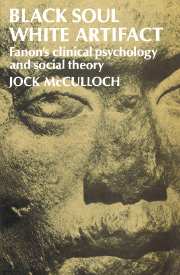Book contents
- Frontmatter
- Contents
- List of abbreviations
- Introduction
- Chapter 1 The three paradigms: negritude, ethnopsychiatry and African socialism
- Chapter 2 Negritude
- Chapter 3 Ethnopsychiatry and the psychopathology of colonialism: Fanon's account of colonised man in ‘Black Skin White Masks’
- Chapter 4 From psychiatric practice to political theory
- Chapter 5 Culture and personality
- Chapter 6 Class conflict and the liberation of Africa
- Chapter 7 The failed revolution
- Chapter 8 The neo-colonial state
- Chapter 9 Towards a critique of Fanon's class analysis
- Chapter 10 Conclusion
- Appendix I Fanon and Mannoni: conflicting psychologies of colonialism
- Appendix II Mental health in Algeria
- Notes
- Select Bibliography
- Index
Chapter 6 - Class conflict and the liberation of Africa
Published online by Cambridge University Press: 07 October 2009
- Frontmatter
- Contents
- List of abbreviations
- Introduction
- Chapter 1 The three paradigms: negritude, ethnopsychiatry and African socialism
- Chapter 2 Negritude
- Chapter 3 Ethnopsychiatry and the psychopathology of colonialism: Fanon's account of colonised man in ‘Black Skin White Masks’
- Chapter 4 From psychiatric practice to political theory
- Chapter 5 Culture and personality
- Chapter 6 Class conflict and the liberation of Africa
- Chapter 7 The failed revolution
- Chapter 8 The neo-colonial state
- Chapter 9 Towards a critique of Fanon's class analysis
- Chapter 10 Conclusion
- Appendix I Fanon and Mannoni: conflicting psychologies of colonialism
- Appendix II Mental health in Algeria
- Notes
- Select Bibliography
- Index
Summary
Imperialism and colonialism
Fanon makes virtually no comment on the historical origins of the modern colonial empires of western Europe. Apart from some scattered references in The Wretched and the collected essays, he ignored the question why black Africa came under European control during the latter half of the nineteenth century. This omission is itself revealing, since it demonstrates the contemporaneous focus of Fanon's writings on the one hand as well as his heavy reliance upon the traditional wisdom of Marxist theories of imperialism.
Following in the footsteps of Lenin, Fanon believed that the colonisation of the Third World was undertaken by European states in order to advance their perceived economic self-interests. Yet, in contrast to Lenin, he preferred the term colonialism to imperialism in describing this relationship. Fanon tended to equate physical occupation with political and economic domination, rather than viewing the relationship in terms of the more sophisticated mechanisms of capital expropriation that appears in the writings of Hilferding, Luxemburg, Kautsky and Lenin. Although he shared much common ground with Lenin in particular, Fanon also diverged a considerable distance from Marxist theory.
Fanon proposed that there are three distinct phases of colonialism: the first he terms ‘extractive’, the second, ‘consumer’ and the last ‘ultra-colonialism’ During the initial phase, Europe viewed the colonies primarily as a source of raw materials. This phase of extractive colonialism led to the accumulation of capital that was to finance the most creative period of bourgeois capitalism.
- Type
- Chapter
- Information
- Black Soul, White ArtifactFanon's Clinical Psychology and Social Theory, pp. 137 - 165Publisher: Cambridge University PressPrint publication year: 1983



